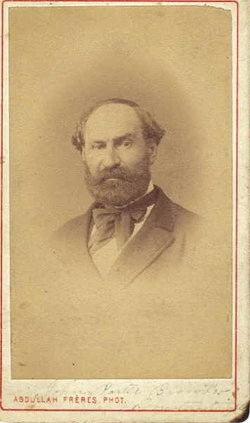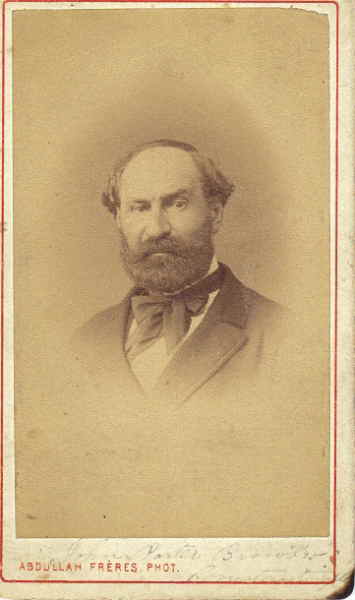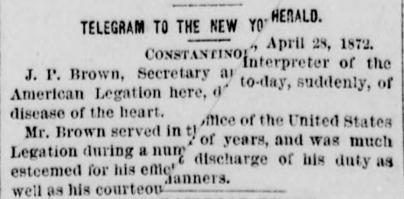*** " THE FATHER OF TURKISH-AMERICAN RELATIONS " ***
MIDSHIPMAN, U. S. NAVY
STATE DEPARTMENT EMPLOYEE
ORIENTALIST, LANGUAGE EXPERT
SPEAKER OF TURKISH, ARABIC, AND FARSI
ASST. DRAGOMAN - 1833
U. S. CONSUL, CONSTANTINOPLE, 1835 - 1836
FIRST DRAGOMAN - 1836
U. S. CONSUL GENERAL, CONSTANTINOPLE, 1857 - 1858
SECRETARY OF LEGATION , 1858 - 1872
U. S. CHARGE d' AFFAIRES, OTTOMAN EMPIRE, 9 TIMES
MARTIN KOSZTA AFFAIR WITH AUSTRIA, 1853
FORTY YEARS SERVICE, 1832 - 1872
+++++++++++++++++++++++++++++++++++
He was known as "The Father of Turkish-American Relations." Was from a very distinguished family, with his maternal uncle being Commodore David Porter."
+++++++++++++++++++++++++++++++++++++
JOHN PORTER BROWN, Early American Orientalist
( 1814 - 1872 )
by Gary Lieser
Journal of the American Orientalist Society
Volume 140, No. 1
Excerpt:
John Porter Brown was born in Chillicothe, Ohio on August 17, 1814. When his father died in 1828, his mother Mary Porter Brown, was left destitute, but she had strong family connections. In 1829 she moved with her son to Tunis where her brother-in- law , Dr. Samuel Heap , was the U. S. Consul. He had been a Navy surgeon who had served many years with the American fleet in the Mediterranean . The young Brown was sent to school in Tunis with his cousins, where he studied French, Italian and Arabic.
Meanwhile, in 1831, Mrs Brown's brother Commodore David Porter, a renowned officer in the US Navy, was appointed America's first minister to the Ottoman Empire, a post he held until 1843. In 1832 he invited his nephew John to Constantinople to serve as his personal secretary.
++++++++++++++++++++++++++++++++++++
Appleton's Encyclopedia
JOHN PORTER BROWN
BROWN, John Porter, oriental scholar, born in Chillicothe, Ohio, 17 August 1814 ; died in Constantinople, Turkey, 28 April 1872. After serving for some years in the navy as a midshipman, in 1832 he accompanied his uncle, David Porter, to Constantinople , where the latter has been sent as first American minister to the porte. He applied himself at once to the study of the oriental languages and literature, and with such success that for many years he was regarded as one of the most accomplished orientalists in Turkey. In 1833 he was appointed assistant dragoman, and three years later was promoted to be first dragoman. From 1858 until his death he was secretary of legations. During his forty years of service he represented the United States nine times as charge d' affaires. He was acting in that capacity when the Hungarian patriot, Martin Koszta, after giving notice of his intended citizenship to the American consul, was seized by the Austrian authorities at Smyrna and sent on board one of their frigates. Koszta appealed to the American legation for protection, and Mr. Brown's simple instructions to Capt. Ingraham of the United States Corvette " DALE " were, " Take him." On receipt of this order the Austrian captain was given three hours to deliver up the prisoner, and meanwhile the American vessel prepared for action. Half an hour before the time expired Koszta was handed over to the French consul, who delivered him to Captain. Ingraham. The day following, two Austrian line-of-battle ships entered the bay ; but the American corvette had sailed. For his conduct on this occasion, Mr. Browm received a service of plate from his American admirers. He was a frequent contributor to American newspapers and magazines, and wrote " Dervishes, or Oriental Spiritualism " ( Philadelphia, 1868 ), and also translated Ahmed Ben Hemden's " Turkish Evening Entertainments " ( New York, 1850 ) and Constantine's " Ancient and Modern Constantinople " ( 1868 ).
++++++++++++++++++++++++++++++++++
WIKIPEDIA
KOSZTA AFFAIR
The KOSZTA AFFAIR ( 1853 ) was the name applied to a diplomatic episode between the United States and the Austrian Empire involving the rights in foreign countries of new Americans who were not yet fully naturalized.
BACKGROUND
Martin Koszta , a man of Hungarian birth, had taken part in the political movement of 1848-49 to separate Hungary from the Austro-Hungarian Empire. He fled to Turkey, then emigrated to the United States. In July 1852, he made a declaration under oath of his intention to become a citizen of the United States and, at the same time, renounced all allegiance to any foreign power.
ABDUCTION
After residing in the United States for a year and eleven months, Koszta returned to Turkey on private business. He was placed under the protection of the United States by the American consul at Smyrna and the American charge' d'affaires ad interim at Constantinople ( JOHN PORTER BROWN ). While waiting to return to the United States, Koszta was captured by Austrian officers and taken by force aboard the Austrian brig-of-war HUSZ'AR and confined in chains. United States officials protested in vain to the Turkish government and the Austrian officers.
Americans learned of rumors that the prisoner was to be transported secretly to Trieste. Under instructions from the American Minister at Constantinople ( JOHN PORTER BROWN ) , Captain Duncan Ingraham of the United States sloop-of-war SAINT LOUIS, which was then lying in Smyrna harbor on July 2, 1853, threatened to open fire on the HUSZAR if Koszta was not surrendered to him by four o'clock. the Austrian consul general agreed to allow Koszta to be held by the consul general of France until some agreement with the United States could be reached.
DIPLOMACY
On August 29. 1853, Baron Hulsemann, the Austrian charge d'affaires in Washington, wrote to Secretary of State William L. Marcy, asking for the United States to ' disavow the conduct of its agents ... hasten to call them to a severe account, and tender to Austria a satisfaction proportionate to the outrage." He said that Koszta was not a naturalized citizen of the US and had never ceased to be a citizen of Austria. Ingraham's threat was thus in violation of international law.
Marcy replied on September 26, 1853, in what is known as the Hulsemann letter. He defended the position of the United States throughout on the ground that Koszta had ceased to be a citizen of Austria even by the law of Austria. His letter said ;
that Koszta when seized and imprisoned was invested with the nationality of the United States, and they had therefore the right, if they chose to exercise it, to extend their protection to him ; that from international law -- the only law which can be rightfully appealed to for rules in this case -- Austria could derive no authority to obstruct or interfere with the United States in the exercise of this right, in effecting the liberation of Koszta ; and that Captain Ingraham's interposition for his release was, under the extraordinary circumstances of the case, right and proper.
The letter was published , to great enthusiasm throughout the United States. The State Department's position in relation to the status of immigrants who were not fully naturalized has been endorsed by various well-known authorities on international law.
Koszta was ultimately released by Austria and allowed to return to the United States. The United States Congress passed a joint resolution of thanks to Captain Ingraham and decorated him with the Congressional Gold Medal , in commemoration of his services.
+++++++++++++++++++++++++++++++
FAMILY :
GRANDFATHER: David Porter ( 1754 - 1808 ), served in the Revolutionary War as a Captain.
UNCLE : David Porter ( 1780 - 1843 ). served in the Barbary War, the War of 1812, and the West Indies. Achieved the rank of Captain and honorary Commodore. First U. S. Minister to the Ottoman Empire.
COUSIN : David Dixon Porter ( 1813 - 1891 ). Civil War Naval admiral. Captured New Orleans and took part in the siege of Vicksburg.
COUSIN : William David Porter ( 1808 - 1864 ) Civil War Naval Officer. Captain of the USS Essex, responsible for attacks along the Mississippi against southern ships and forts.
+++++++++++++++++++++++++++++++++++++
Researched and transcribed by :
ED CATTERSON
[email protected]
1/8/22
*** " THE FATHER OF TURKISH-AMERICAN RELATIONS " ***
MIDSHIPMAN, U. S. NAVY
STATE DEPARTMENT EMPLOYEE
ORIENTALIST, LANGUAGE EXPERT
SPEAKER OF TURKISH, ARABIC, AND FARSI
ASST. DRAGOMAN - 1833
U. S. CONSUL, CONSTANTINOPLE, 1835 - 1836
FIRST DRAGOMAN - 1836
U. S. CONSUL GENERAL, CONSTANTINOPLE, 1857 - 1858
SECRETARY OF LEGATION , 1858 - 1872
U. S. CHARGE d' AFFAIRES, OTTOMAN EMPIRE, 9 TIMES
MARTIN KOSZTA AFFAIR WITH AUSTRIA, 1853
FORTY YEARS SERVICE, 1832 - 1872
+++++++++++++++++++++++++++++++++++
He was known as "The Father of Turkish-American Relations." Was from a very distinguished family, with his maternal uncle being Commodore David Porter."
+++++++++++++++++++++++++++++++++++++
JOHN PORTER BROWN, Early American Orientalist
( 1814 - 1872 )
by Gary Lieser
Journal of the American Orientalist Society
Volume 140, No. 1
Excerpt:
John Porter Brown was born in Chillicothe, Ohio on August 17, 1814. When his father died in 1828, his mother Mary Porter Brown, was left destitute, but she had strong family connections. In 1829 she moved with her son to Tunis where her brother-in- law , Dr. Samuel Heap , was the U. S. Consul. He had been a Navy surgeon who had served many years with the American fleet in the Mediterranean . The young Brown was sent to school in Tunis with his cousins, where he studied French, Italian and Arabic.
Meanwhile, in 1831, Mrs Brown's brother Commodore David Porter, a renowned officer in the US Navy, was appointed America's first minister to the Ottoman Empire, a post he held until 1843. In 1832 he invited his nephew John to Constantinople to serve as his personal secretary.
++++++++++++++++++++++++++++++++++++
Appleton's Encyclopedia
JOHN PORTER BROWN
BROWN, John Porter, oriental scholar, born in Chillicothe, Ohio, 17 August 1814 ; died in Constantinople, Turkey, 28 April 1872. After serving for some years in the navy as a midshipman, in 1832 he accompanied his uncle, David Porter, to Constantinople , where the latter has been sent as first American minister to the porte. He applied himself at once to the study of the oriental languages and literature, and with such success that for many years he was regarded as one of the most accomplished orientalists in Turkey. In 1833 he was appointed assistant dragoman, and three years later was promoted to be first dragoman. From 1858 until his death he was secretary of legations. During his forty years of service he represented the United States nine times as charge d' affaires. He was acting in that capacity when the Hungarian patriot, Martin Koszta, after giving notice of his intended citizenship to the American consul, was seized by the Austrian authorities at Smyrna and sent on board one of their frigates. Koszta appealed to the American legation for protection, and Mr. Brown's simple instructions to Capt. Ingraham of the United States Corvette " DALE " were, " Take him." On receipt of this order the Austrian captain was given three hours to deliver up the prisoner, and meanwhile the American vessel prepared for action. Half an hour before the time expired Koszta was handed over to the French consul, who delivered him to Captain. Ingraham. The day following, two Austrian line-of-battle ships entered the bay ; but the American corvette had sailed. For his conduct on this occasion, Mr. Browm received a service of plate from his American admirers. He was a frequent contributor to American newspapers and magazines, and wrote " Dervishes, or Oriental Spiritualism " ( Philadelphia, 1868 ), and also translated Ahmed Ben Hemden's " Turkish Evening Entertainments " ( New York, 1850 ) and Constantine's " Ancient and Modern Constantinople " ( 1868 ).
++++++++++++++++++++++++++++++++++
WIKIPEDIA
KOSZTA AFFAIR
The KOSZTA AFFAIR ( 1853 ) was the name applied to a diplomatic episode between the United States and the Austrian Empire involving the rights in foreign countries of new Americans who were not yet fully naturalized.
BACKGROUND
Martin Koszta , a man of Hungarian birth, had taken part in the political movement of 1848-49 to separate Hungary from the Austro-Hungarian Empire. He fled to Turkey, then emigrated to the United States. In July 1852, he made a declaration under oath of his intention to become a citizen of the United States and, at the same time, renounced all allegiance to any foreign power.
ABDUCTION
After residing in the United States for a year and eleven months, Koszta returned to Turkey on private business. He was placed under the protection of the United States by the American consul at Smyrna and the American charge' d'affaires ad interim at Constantinople ( JOHN PORTER BROWN ). While waiting to return to the United States, Koszta was captured by Austrian officers and taken by force aboard the Austrian brig-of-war HUSZ'AR and confined in chains. United States officials protested in vain to the Turkish government and the Austrian officers.
Americans learned of rumors that the prisoner was to be transported secretly to Trieste. Under instructions from the American Minister at Constantinople ( JOHN PORTER BROWN ) , Captain Duncan Ingraham of the United States sloop-of-war SAINT LOUIS, which was then lying in Smyrna harbor on July 2, 1853, threatened to open fire on the HUSZAR if Koszta was not surrendered to him by four o'clock. the Austrian consul general agreed to allow Koszta to be held by the consul general of France until some agreement with the United States could be reached.
DIPLOMACY
On August 29. 1853, Baron Hulsemann, the Austrian charge d'affaires in Washington, wrote to Secretary of State William L. Marcy, asking for the United States to ' disavow the conduct of its agents ... hasten to call them to a severe account, and tender to Austria a satisfaction proportionate to the outrage." He said that Koszta was not a naturalized citizen of the US and had never ceased to be a citizen of Austria. Ingraham's threat was thus in violation of international law.
Marcy replied on September 26, 1853, in what is known as the Hulsemann letter. He defended the position of the United States throughout on the ground that Koszta had ceased to be a citizen of Austria even by the law of Austria. His letter said ;
that Koszta when seized and imprisoned was invested with the nationality of the United States, and they had therefore the right, if they chose to exercise it, to extend their protection to him ; that from international law -- the only law which can be rightfully appealed to for rules in this case -- Austria could derive no authority to obstruct or interfere with the United States in the exercise of this right, in effecting the liberation of Koszta ; and that Captain Ingraham's interposition for his release was, under the extraordinary circumstances of the case, right and proper.
The letter was published , to great enthusiasm throughout the United States. The State Department's position in relation to the status of immigrants who were not fully naturalized has been endorsed by various well-known authorities on international law.
Koszta was ultimately released by Austria and allowed to return to the United States. The United States Congress passed a joint resolution of thanks to Captain Ingraham and decorated him with the Congressional Gold Medal , in commemoration of his services.
+++++++++++++++++++++++++++++++
FAMILY :
GRANDFATHER: David Porter ( 1754 - 1808 ), served in the Revolutionary War as a Captain.
UNCLE : David Porter ( 1780 - 1843 ). served in the Barbary War, the War of 1812, and the West Indies. Achieved the rank of Captain and honorary Commodore. First U. S. Minister to the Ottoman Empire.
COUSIN : David Dixon Porter ( 1813 - 1891 ). Civil War Naval admiral. Captured New Orleans and took part in the siege of Vicksburg.
COUSIN : William David Porter ( 1808 - 1864 ) Civil War Naval Officer. Captain of the USS Essex, responsible for attacks along the Mississippi against southern ships and forts.
+++++++++++++++++++++++++++++++++++++
Researched and transcribed by :
ED CATTERSON
[email protected]
1/8/22
Family Members
Advertisement
Explore more
Sponsored by Ancestry
Advertisement




